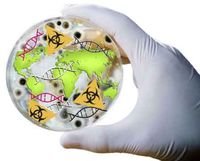Does Genetic engineering really help- some thoughts and facts

- Genetic engineering does not help against hunger
one third of all food is lost or wasted. The prices for basic foods such as rice and cereals has increased considerably over the years. For the cultivation of food plants available areas increasingly compete with areas for the cultivation of energy and forage crops. In addition, there is a dramatic loss of soil surface and soil fertility by intensive land use. Genetic engineering has so far none of this can solve problems - on the contrary, it tends to be the spearhead of industrial agriculture.
- Genetic engineering leads to more poison on the field
, which is currently the most genetically modified plants are grown, are genetically modified in such a way that they are immune to certain herbicides. In this case, the seed and the appropriate poison often sold by the same company. Is the current market leader, the Monsanto with herbicide-resistant crops against the spraying glyphosate ("Roundup") insensitive ("Roundup Ready"). The same system, partly with other active ingredients, is also used by Bayer, Syngenta, Dow or pioneer
- Genetic engineering restricts rights of farmers and breeders a for a
long time, the principle that plants, animals or microorganisms cannot be "invented" and thus not can be patented. Once in the year 2000, the highest judicial authority in the European patent law, the Enlarged Board of Appeal of the European Patent Office in Munich, has decided that genetically engineered plants and animals are in principle patentable, patents on genetically modified plants and animals were granted a few thousand
4 Genetic engineering reduces biodiversity
precisely because of climate change, we are on the wealth of flora and fauna. We need him in the future to draw from the genetic diversity and plants to adapt to difficult conditions in the last century, but 75 percent of the cultivated varieties of our agriculture disappeared. Genetically modified plants will only work in an industrial farming system: cultivation as a mono-culture and use of fertilizers and pesticides. more...
- Genetic engineering leads to high costs
in the discussion about the advantages or disadvantages of agricultural genetic engineering is often forgotten by the cultivation of genetically modified plants in considerable follow-up costs for society as a whole. During transport and in the cultivation can lead to contamination of raw materials and non-GM crops. This will cause problems for the farmers, producers and processors of food and also for seed breeders. The protection you need substantial additional costs. more...
- Genetic engineering risks are not sufficiently investigated
the health effects of a long-term consumption of genetically modified plants, there is almost no independent investigations. However, there is evidence of risks: for example, animal feeding studies with genetically modified Monsanto corn effects on blood parameters. The poison that could produce the crops for insect repellent, other studies have shown that affect the immune system. The arable poison glyphosate is sprayed on many GM plantations systematically, according to cancer research agency IARC as "probably carcinogenic".
Hope you got inspired on the real problems of the world and thats not easy to solve it